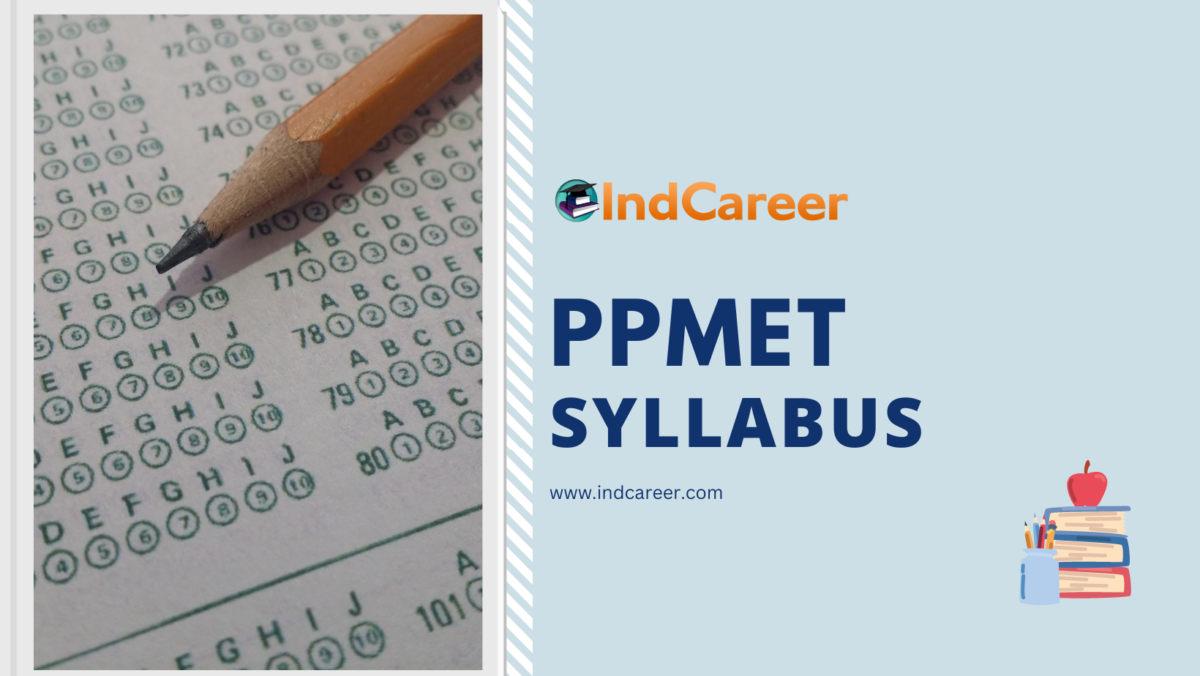Contents
The Punjab Para Medical Entrance Test (PPMET) is a gateway to a promising career in the para-medical field. Understanding the PPMET syllabus is pivotal for effective preparation and securing a coveted spot in para-medical courses. This article aims to unravel the intricacies of the PPMET syllabus, providing aspirants with a clear roadmap to navigate their way toward success.
PPMET 2025 Syllabus has been released. Scroll down for details and to download PDF.
PPMET Syllabus
Aspirants can go through the syllabus of the PPMET exam.
PPMET Physics Syllabus
- Physical World and Measurement
- Kinematics
- Work, Energy, and Power
- Laws of Motion
- Gravitation
- Motion of System of Particles and Rigid Body
- Properties of Bulk Matter
- Thermodynamics
- Oscillations and Waves
- Electrostatics
- Optics
- Electromagnetic Induction and Alternating Currents
- Communication Systems
Chemistry Syllabus for PPMET
- Some Basic Concepts of Chemistry
- Structure of Atom
- Classification of Elements and Periodicity in Properties
- Chemical Bonding and Molecular Structure
- Solid State
- States of Matter: Gases and Liquids
- Chemical Bonding and Molecular Structure
- Thermodynamics
- Chemical Kinetics
- Equilibrium
- Surface Chemistry
- Redox Reactions
- Coordination Compounds
- Alcohols, Phenols, and Ethers
- Hydrocarbons
Biology Syllabus of PPMET exam
- Diversity in Living World
- Structural Organization in Animals and Plants
- Cell Structure and Function
- Plant Physiology
- Human Physiology
- Reproduction
- Biology and Human Welfare
- Biotechnology and its applications
- Ecology and environment
PPMET Exam Pattern
- Mode of Examination: The PPMET is conducted as a pen-and-paper test (offline).
- Duration: Candidates have 3 hours to complete the exam.
- Total Questions: The exam consists of 200 multiple-choice questions (MCQs).
- Marking Scheme: Each question carries 4 marks, leading to a total of 800 marks. There is no negative marking, encouraging candidates to attempt all questions.
- Subjects Covered: The questions are distributed across the following subjects:
- Physics: 50 questions
- Chemistry: 50 questions
- Biology: 100 questions (divided into Botany and Zoology)
Preparation Tips
- Understand the Exam Pattern: Familiarize yourself with the structure of the exam to strategize your study plan effectively.
- Comprehensive Study: Cover all topics within the syllabus thoroughly, ensuring a balanced preparation across all subjects.
- Practice with Previous Papers: Utilize previous year question papers and mock tests to enhance your understanding of the exam format and improve time management skills.
PPMET
The Punjab Para Medical Entrance Test (PPMET) is a State level Nursing entrance exam. It is organized by Baba Farid University of Health Sciences (BFUHS) for admission to B.Sc. Nursing in Nursing Colleges of Punjab., Punjab Para Medical Entrance Test (PPMET) stands as a pivotal gateway for aspiring individuals seeking to embark on a rewarding career in the para-medical field. This comprehensive examination opens doors to a range of para-medical courses, providing a vital platform for students to pursue their passion for healthcare and contribute to the well-being of society.
Quick Links
PPMET Syllabus – Overview
| Aspect of PPMET Syllabus | Details |
|---|---|
| Name of exam | PPMET |
| Full form of exam name | Punjab Para Medical Entrance Test |
| Official Body for exam and PPMET syllabus | BFUHS |
| Full form of organization | Baba Farid University of Health Sciences |
| Scope of PPMET syllabus | State |
| Exam Type | Nursing Entrance Exam |
| Courses for which PPMET syllabus is to be studied | B.Sc. Nursing |
| Official website for PPMET syllabus | bfuhs.ac.in |
FAQs
While the core syllabus remains largely constant, minor changes might occur. It’s essential to refer to the most recent syllabus.
Yes, the English section carries its weight and tests candidates’ language proficiency, which is crucial in the medical field.
Regular practice with mock tests helps in honing time management skills and ensures that you complete the exam within the stipulated time.
Reputable reference books and study materials aligned with the syllabus can be beneficial. Seek guidance from educators or coaching institutes.
The mathematics section covers basic concepts, and with consistent practice, even non-mathematics students can excel in this segment.
